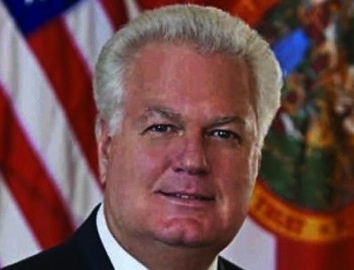NC joined controversial voter cross-check program as other states were leaving

Under Republican elections chief Ken Detzner, Florida dropped out of the controversial Interstate Crosscheck program. Oregon has also left, saying Crosscheck's data is "unreliable." (Photo from Florida Secretary of State's website.)
On April 2, 2014, leaders of North Carolina's state election board announced they had participated in a national program to verify voters run by Kansas' controversial secretary of state, Kris Kobach.
The results ignited a firestorm: Media outlets and Republican lawmakers quickly declared that plugging North Carolina's voter data into Kobach's Interstate Crosscheck program had revealed proof of "widespread voter fraud" and justified a host of voter restrictions passed in 2013.
But Interstate Crosscheck has been hounded by controversy since it launched in Kobach's office in 2005. Despite initial hysteria about alleged fraud — as happened this month in North Carolina — few actual cases of fraud have been referred for prosecution, as presumed cases of double voting in multiple states turn out to be clerical and other errors.
Amidst the controversy, at least two states have dropped out of the program, just as North Carolina was joining it.
In Florida, Republican Secretary of State Ken Detzner decided against participating in the program earlier this year. In a presentation promoting Crosscheck to Indiana election officials in December 2013, Kobach's office showed Florida joining the program in 2013 and continuing to be a participant in 2014.
But the Miami Herald's Naked Politics blog notes that Florida has dropped out of the program, and the last voter information the state sent to Crosscheck was from 2012. When asked about why Florida left Crosscheck, a spokeswoman from Detzner's office replied:
The Department of State and Supervisors of Elections currently work with elections officials in other states to update registrations regarding residency, and we are always exploring options to improve the elections process.
According to the Naked Politics blog, Oregon also abandoned Kobach's Interstate Crosscheck. Tony Green, spokesman for Oregon's secretary of state, gave this explanation:
We left because the data we received was unreliable and we felt joining the ERIC project would better meet our needs.
ERIC stands for the Electronic Registration Information Center, a project started by the Pew Charitable Trusts that now includes nine states (Colorado, Connecticut, Delaware, Maryland, Nevada, Oregon, Utah, Virginia and Washington) and Washington, D.C.
The ERIC project hasn't generated as much publicity or controversy. But interestingly, in December 2013 — the same month that North Carolina election officials were joining Kobach's Crosscheck program — RTI International in North Carolina released a report [pdf] highlighting ERIC's success.
In evaluating ERIC's first year, RTI International, formerly known as the Research Triangle Institute, concluded, "Our analysis, based on high quality, independent data, finds that ERIC states improved on every measure we considered," including boosting voter registration and turnout and eliminating errors in voter files.
Why did North Carolina officials choose to use Kobach's controversial voter verification system instead of one endorsed by a prominent North Carolina-based research center?
On April 4, Facing South emailed N.C. State Board of Elections spokesman Josh Lawson — who previously worked for former Attorney General John Ashcroft, a forefather of the modern crusade against alleged voter fraud — for information on the board's decision to use Crosscheck. The office has not yet replied.
Tags
Chris Kromm
Chris Kromm is executive director of the Institute for Southern Studies and publisher of the Institute's online magazine, Facing South.
